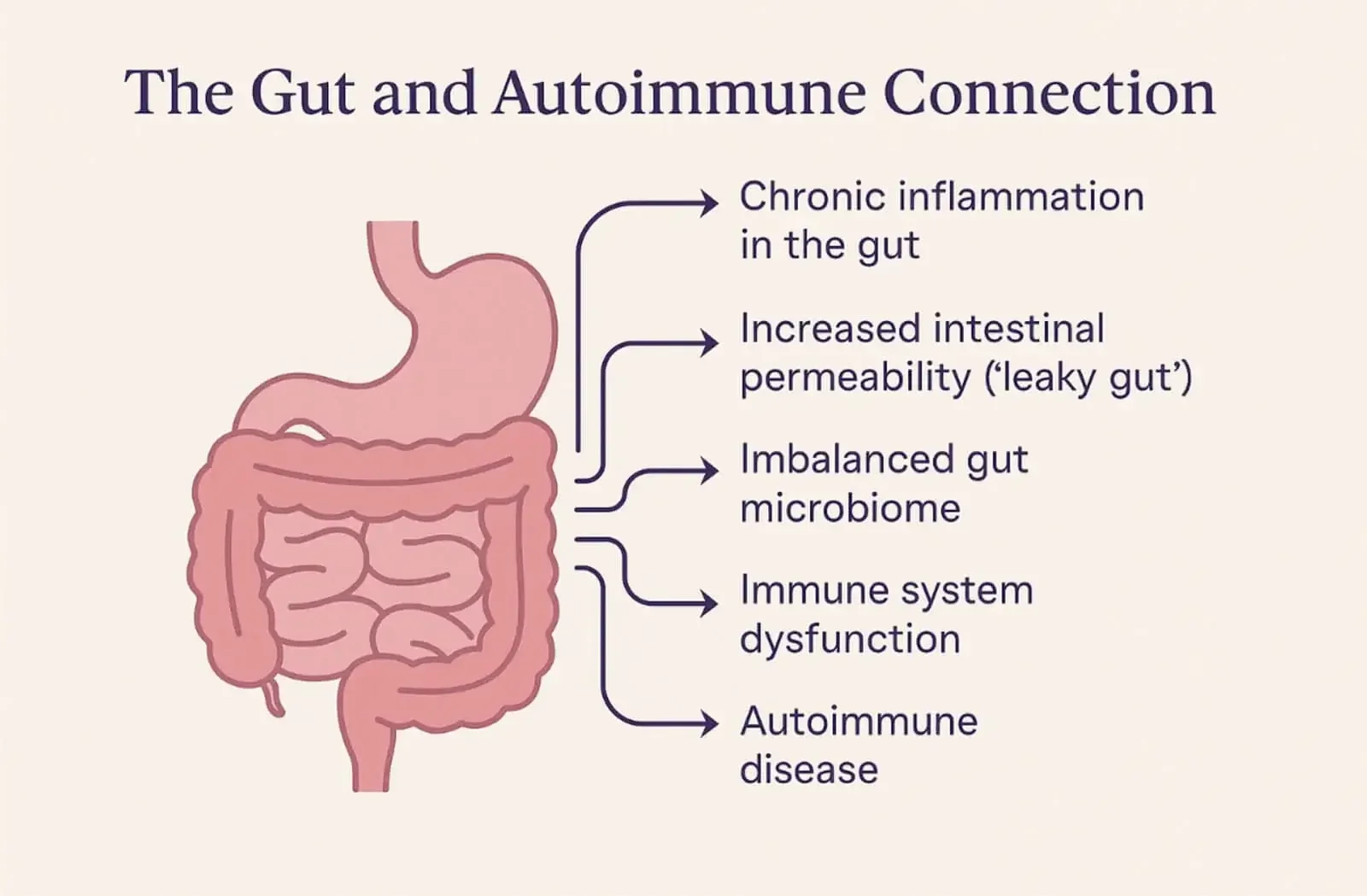What Is the AIP Diet? A Complete Guide to the Autoimmune Protocol Diet
Updated 3 October 2025 • UK English
Introduction: Why Try the AIP Diet?
The Autoimmune Protocol (AIP) diet, also known as the autoimmune paleo diet, is often recommended for individuals living with autoimmune disorders. This dietary approach is associated with lowering gut inflammation, which is thought to be a key driver behind autoimmune activity and many chronic health conditions.
By addressing inflammation through nutrition, the AIP can help restore gut health, leading to significant improvements and even reversal of certain autoimmune symptoms. Since gut integrity and microbiome balance play a crucial role not only in autoimmune disease but also in conditions such as depression and cognitive decline, focusing on gut healing can have widespread benefits.
With guidance from Functional Medicine and a nutrition-focused approach, you can target the underlying causes of poor health, alleviate symptoms, and move toward long-term wellness.
At Lantern Clinic, we implement the AIP diet selectively and strategically. It is not a permanent solution or a miracle cure, but in the right context, it can serve as a powerful tool for healing.
Research on the AIP diet suggests that it may help people with autoimmune disorders by focusing on whole foods and avoiding inflammatory triggers. The diet is similar to the Mediterranean diet in its emphasis on nutrient-dense, anti-inflammatory foods. By following the AIP diet, individuals can manage their autoimmune conditions effectively and improve their overall health.
In summary, the AIP diet aims to reduce symptoms of autoimmune diseases through a carefully structured meal plan that prioritises healing and well-being.
If you’re wondering whether the AIP diet could be a good fit for your healing journey, our doctors can help you explore it in a safe and supportive way.
What Is The AIP Diet?
The AIP diet (Autoimmune Protocol diet) is an elimination diet designed to help people with autoimmune conditions reduce inflammation, uncover food triggers, and support gut health. An extension of the Palaeo diet, it is more restrictive and is often described as a targeted anti-inflammatory diet.
It has three phases:
Elimination (4–12 weeks): remove foods that may trigger an autoimmune response, while focusing on nutrient-dense whole foods.
Reintroduction: add foods back one at a time to test tolerance and identify triggers.
Personalised maintenance: build a balanced diet tailored to your needs.
Research suggests the AIP diet may help people with conditions like inflammatory bowel disease, Hashimoto’s thyroiditis, and rheumatoid arthritis.
The Elimination Phase of the AIP Diet
The first phase of the AIP diet is the elimination phase. You eliminate foods that may trigger an autoimmune response for 4–12 weeks to allow the gut and immune system to settle.
Foods to Eliminate
Grains and legumes
Dairy and eggs
Nightshades (tomatoes, peppers, aubergine, white potatoes)
Nuts, seeds, and seed oils
Processed food and food additives
Refined sugars, alcohol, and coffee
Foods Allowed on the AIP Diet
Whole foods such as vegetables and fruit (excluding nightshades)
Quality proteins: poultry, fish, grass-fed meat, organ meats
Fermented foods (e.g., sauerkraut, coconut yoghurt)
Nutrient-dense foods such as bone broth, shellfish, and liver
Healthy fats: olive, avocado, and coconut oils
Reintroduction Phase: How to Reintroduce Foods Back Into Your Diet.
After several weeks, begin the reintroduction phase of the AIP diet. Add different food groups back one at a time to assess tolerance:
Select one food (e.g., egg yolk or white rice) and try a small amount.
Increase gradually over 3–7 days while monitoring symptoms.
Track changes in joint pain, digestion, energy, mood, and skin.
If symptoms flare, remove the food and wait before testing another.
The final phase of the AIP is a personalised eating plan, keep tolerated foods and avoid those that trigger flares.
Benefits and Research on the AIP Diet
The efficacy of the autoimmune protocol is still being studied, but small trials indicate the AIP diet may help reduce symptoms in some people with autoimmune disorders. Potential benefits include improved digestion, reduced joint pain, better energy and sleep, and quality-of-life gains (especially noted in some IBD cohorts). The diet is not a cure and should be monitored to maintain a balanced diet.
Managing Autoimmune Conditions Beyond Diet
The AIP diet is one tool to manage autoimmune conditions. Pair it with stress management, quality sleep, gentle movement, and medical care. Some people also do well with elements of the Mediterranean diet as part of a broader diet and lifestyle approach.
At Lantern Clinics, our functional medicine doctors are on hand to give personalised advice on additional ways to manage these conditions and support long-term health.
Comparing the AIP Diet With Other Diets
| Feature | AIP Diet | Palaeo Diet | Mediterranean Diet |
|---|---|---|---|
| Eggs, nuts, seeds, nightshades | Removed initially | Allowed | Allowed |
| Phased reintroduction | Yes | No | No |
| Primary focus | Autoimmune patients | General wellness | Cardiometabolic health |
| Evidence base | Emerging | Moderate | Strong (general) |
Is the AIP Diet Right for You?
The AIP diet can help some people manage their autoimmune condition, but it is not suitable for everyone.
We do not recommend starting the AIP diet without first consulting a medical or nutritional professional.
This is especially important if you are pregnant, underweight, have a history of eating disorders, or have higher-than-average energy needs. If you experience symptoms associated with autoimmune conditions and are considering trying the AIP diet, seek guidance from a qualified practitioner to ensure it is safe and appropriate for you.
If you would like to discuss the AIP diet or explore your wider health, book a free discovery call with one of our practitioners below.
FAQs About the Autoimmune Protocol Diet
-
Typically 4–12 weeks, adjusted to symptom response and clinician advice.
-
Vegetables (excluding nightshades), fruit, quality meat and fish, bone broth, fermented foods, and healthy fats such as olive, avocado, and coconut oils.
-
The AIP diet may help reduce inflammation and improve quality of life for some, but evidence is still developing and results vary.
-
The strict elimination is not intended for long-term use. The goal is a personalised, balanced diet after careful reintroduction.
-
The AIP diet can carry risks because it is very restrictive; without professional guidance it may cause nutrient gaps, low energy, or make social eating difficult.
-
The AIP diet is not a weight-loss plan; its purpose is to reduce inflammation and manage autoimmune symptoms, though some people may notice weight changes as a side effect.
Final Thoughts
The AIP diet is an evidence-informed elimination approach designed to reduce inflammation and identify your unique food triggers. While it isn’t a cure for autoimmune disease, many people find it helps ease symptoms and improves quality of life, especially when combined with supportive lifestyle habits and professional medical care.
Your health journey doesn’t have to feel overwhelming, with the right tools, support, and compassionate care, you can take meaningful steps toward clarity, balance, and lasting wellbeing.
Book a 15-minute AIP Readiness Call
Educational only; not medical advice.


